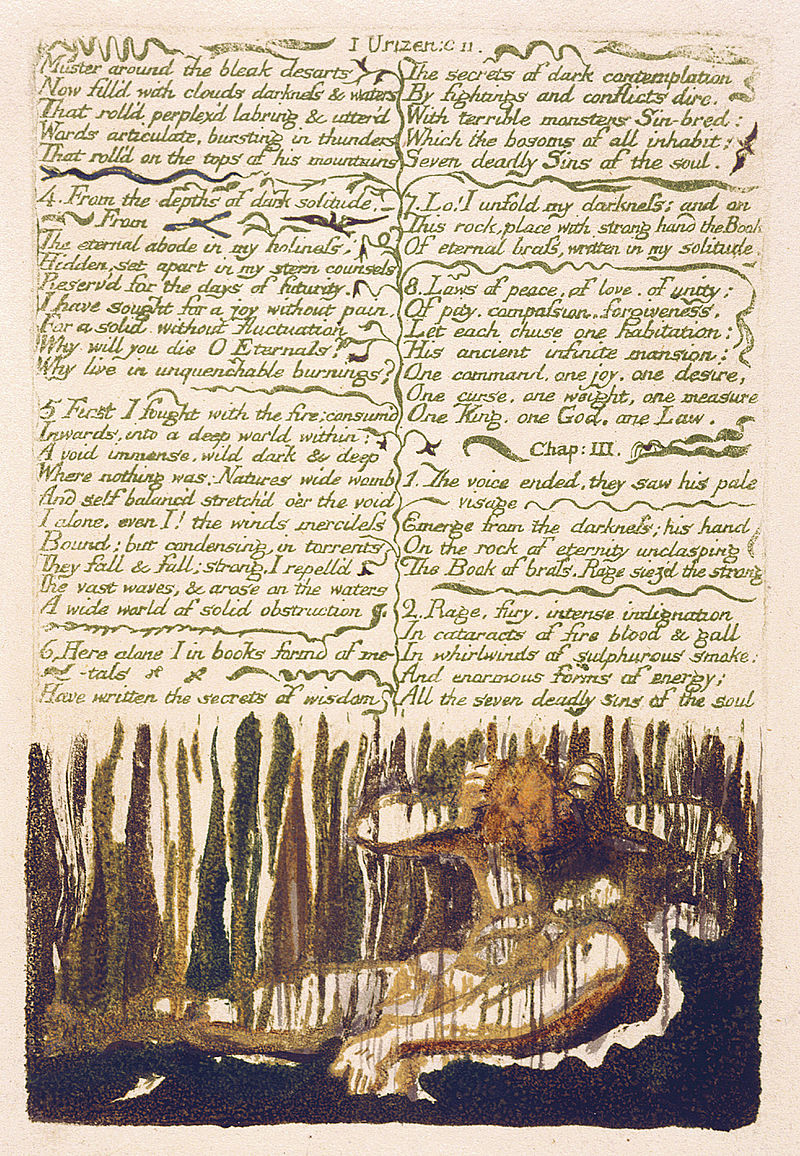| British Museum Small Book of Designs |
Four Zoas, Night I, PAGE 4, (E 301)
"In Eden; in the Auricular Nerves of Human life
Which is the Earth of Eden, he his Emanations propagated
Fairies of Albion afterwards Gods of the Heathen, Daughter of Beulah Sing
His fall into Division & his Resurrection to Unity
His fall into the Generation of Decay & Death & his Regeneration
by the Resurrection from the dead
Begin with Tharmas Parent power. darkning in the West
Lost! Lost! Lost! are my Emanations Enion O Enion
We are become a Victim to the Living We hide in secret
I have hidden Jerusalem in Silent Contrition O Pity Me
I will build thee a Labyrinth also O pity me O Enion
Why hast thou taken sweet Jerusalem from my inmost Soul
Let her Lay secret in the Soft recess of darkness & silence
It is not Love I bear to [Jerusalem] It is Pity
She hath taken refuge in my bosom & I cannot cast her out.
The Men have recieved their death wounds & their Emanations are fled
To me for refuge & I cannot turn them out for Pitys sake
Enion said--Thy fear has made me tremble thy terrors have surrounded me
All Love is lost Terror succeeds & Hatred instead of Love
And stern demands of Right & Duty instead of Liberty.
Once thou wast to Me the loveliest son of heaven--But now
Why art thou Terrible and yet I love thee in thy terror till
I am almost Extinct & soon shall be a Shadow in Oblivion
Unless some way can be found that I may look upon thee & live
Hide me some Shadowy semblance. secret whispring in my Ear
In secret of soft wings. in mazes of delusive beauty
I have lookd into the secret soul of him I lovd
And in the Dark recesses found Sin & cannot return
Trembling & pale sat Tharmas weeping in his clouds"
| British Museum Gates of Paradise Copy B, Plate 6 |
Four Zoas, Night I, Page 5, (E 302)
"Tharmas groand among his Clouds
Weeping, then bending from his Clouds he stoopd his innocent head
And stretching out his holy hand in the vast Deep sublime
Turnd round the circle of Destiny with tears & bitter sighs
And said. Return O Wanderer when the Day of Clouds is oer"
 |
| Wikipedia Commons Book of Urizen Plate 4 |
Book of Urizen, Plate 5, (E 72)
"In living creations appear'd
In the flames of eternal fury.
3. Sund'ring, dark'ning, thund'ring!
Rent away with a terrible crash
Eternity roll'd wide apart
Wide asunder rolling
Mountainous all around
Departing; departing; departing:
Leaving ruinous fragments of life
Hanging frowning cliffs & all between
An ocean of voidness unfathomable."
No comments:
Post a Comment